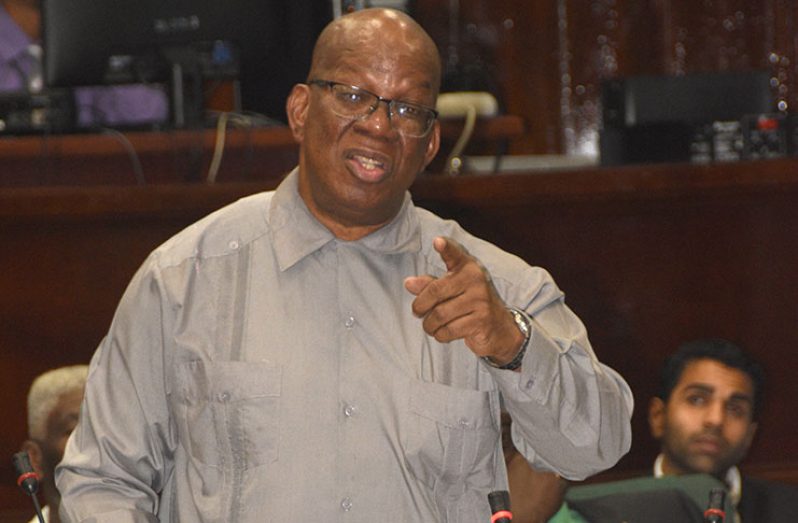–blame GuySuco’s predicament on poor management under PPP, Jordan says
THAT the Guyana Sugar Corporation (GuySuCo) lost in excess of €30M is no fault of the government’s, Finance Minister Winston Jordan says.
Rather, it was all due to poor management and oversight by the People’s Progressive Party (PPP) Administration, he told the House on Friday evening as he responded to criticisms from the parliamentary oppositiom over the government’s handling of the sugar industry.
As the 2018 National Budget debate wrapped up on Friday, Minister Jordan reminded his parliamentary colleagues that in 2006, the European Union (EU) entered into an arrangement with the Government of Guyana to facilitate the transfer of funds under what was called the Accompanying Measures for Sugar Protocol. That money, he explained, was divided into two tranches, namely: fixed and variable.
However, in order to access the agreed funds, the government and the sugar corporation were mandated to reach a number of criteria with respect to financial management and accountability.
But according to the Finance Minister, GuySuCo failed to meet a number of benchmarks set out for the disbursement. At first, he said, things went pretty smoothly, in that the agreed Variable Tranche of €1.63M was met and duly disbursed.
That was in 2006. But by 2007, GuySuCo had begun to fall short of reaching the criteria. In that year, the Variable Tranche was €13.213M, but only €6.60M was disbursed.
“GuySuCo failed to meet the targets; they failed to meet over 50% of the targets, and therefore less than 50% was disbursed,” Minister Jordan told the National Assembly, the composition of which at that point comprised mostly government Members of Parliament.
That was primarily because all but one of the opposition MPs had staged a walkout ahead of Prime Minister Moses Nagamootoo’s taking to the floor to make a presentation before Minister Jordan did.
Moving on with his presentation, Minister Jordan said GuySuCo’s trend of failing to meet its targets was to continue in 2008, in that of the agreed €12.860M, only 7.25M was disbursed.
The same thing happened in 2009, whereby of the agreed €8.9M, only 6.264M was disbursed. In 2010, it was 3.255M of €9.3M, while in 2011, €12.35M was agreed but only 7. 41M was disbursed.
However, in 2012, things began to look up somewhat, as the agreed €18.56M was met and disbursed, but the euphoria was short-lived, as more money was lost in 2013.
“In 2013, €16.1M was agreed, but only 12.884M was disbursed,” Minister Jordan said, adding that while there were no arrangements between the government and the EU in 2014 and 2015, a €20.74M target was agreed in 2016, but only €17.524M was disbursed.
According to Minister Jordan, the aggregate sum agreed on was €112.879M, but only 81.385M was disbursed. “So, GuySuCo lost critical funding of in excess of €30M; you must know this,” he told his colleagues.
Giving a breakdown on what obtained under the fixed tranche, Minister Jordan said that not only was the government able to reach the targets, but a series of funds was also made available through the agreement.
“Credit to the then government, they never failed any of those targets, so money was disbursed in each year, identical to what was agreed,” he said, adding:
“So, for example in 2006, €3.27M was the fixed tranche, and that was disbursed. In 2007, the fixed tranche of €13.213M was agreed and disbursed.
“In 2008, €12.086M was agreed and disbursed.”
And so it continued up until 2016. “So, for a total of between 2006 and 2016, €77.55M was agreed and disbursed under the fixed tranche,” Minister Jordan said.
Though acknowledging that the sugar industry has been a mainstay for the country, he said the painful crisis it is currently experiencing is all because it was poorly managed under the previous PPP Administration.
He posited that the EU had long said that the Accompanying Measures for Sugar Protocol was coming to an end. Though the EU signalled this over a decade ago, Minister Jordan argued that it was ignored, and the PPP Administration took a decision to invest over US$200M in the Skeldon Sugar Factory and the Modernisation Project for the sugar industry.
“In fact, on the loan side alone, over US$125M was borrowed. We have roughly about US$29M borrowed from the Caribbean Development Bank (CDB); another US$40M was borrowed from the Exim Bank of China; and another US$56M in a combination of World Bank loans and Government of Guyana reserves, making it a total of US$125M of borrowed money,” Minister Jordan told the National Assembly. Additionally, funds were pumped into the modernisation project, using revenues from GuySuCo.
“Not a penny of this money is being repaid by GuySuCo; not a penny,” the Finance Minister lamented, while positing that the corporation does not have the capacity to repay those loans.
“They do not have the money, so this is being paid with taxpayers’ funds; the very taxes that the honourable member, the opposition leader said we were raking in,” Minister Jordan said.
Under the 2018 Budget, government has set aside $6.3B for GuySuCo, as it forges ahead with its divestment programme for the Industry.




.png)









